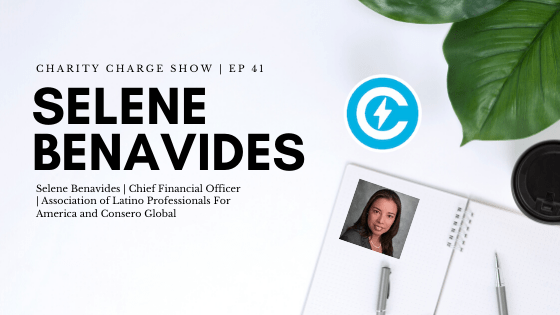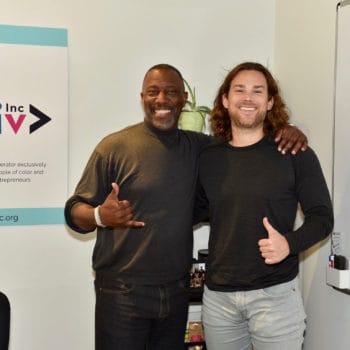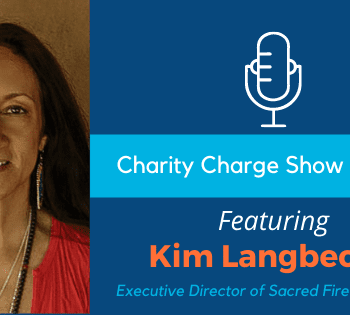In episode 41 of The Charity Charge Show, Stephen Garten chats with Selene Benavides, Chief Financial Officer at The Association of Latino Professionals For America and Consero Global.
Selene Benavides is Client Finance Director with Consero Global where she helps companies address complex financial requirements with software applications while scaling finance operations more efficiently and reducing G&A expenses to allow for greater investment in driving and supporting top line growth for her clients.
Prior to her new role, Ms. Benavides was the Chief Financial Officer/Chief Operations Officer for the National Society of Hispanic MBAs, located in Irving, Texas where she was responsible for helping its leadership define the strategic direction of the organization, enhance its offerings and reduce its expenses, all while overseeing the Operations, Finance, Legal, and IT functions of the business which includes 40 Chapters across the nation.
Can you share a bit of your background and the overall mission of ALPFA?
I started in the corporate world, worked there for 15 years and decided to sit on the national board of directors for a nonprofit sister organization to ALPFA. Great experience. I learned a lot and decided I wanted to continue down that route. At the time I joined, ALPFA was $5 million dollars in debt, so we had to restructure the entire accounting and finance infrastructure. We outsourced it and were able to cut costs and after 3 or 4 years we are no longer in debt and have money in the bank to get us through the coronavirus. We really just put our heads down and were frugal when we needed to be, but invested in things that we needed to invest in that would make a greater impact. So that’s kind of what I’ve been doing for the last 10 years.
At ALPFA, we exist to connect Latinos to have more of an impact. So how do we do that? We want to make sure that they’re knowledgeable and prepared for society and for life as they graduate from college, go on to grad school, and get the top job C corporations and fortune 500 or 1000 companies. But in order for us to do that, we had to have a strong infrastructure and a strong foundation. So we have to make sure that we’re implementing efficiencies and cost effective processes… We are a decentralized organization. So we have a national office with 46 chapters across the United States as well as about 125 student chapters. So a pretty big footprint when you look at it, it takes a lot of horsepower to keep engagement across the nation, especially in today’s environment. So we’re trying to create that infrastructure. And then last but not least, we’re looking to highlight a lot of the successes in our communities as we’ve had a lot of students who have made it into the top jobs and are excelling in their careers. We don’t do enough of that and we want to do more.
What are some of the practical things that you did to get your organization out of debt?
Well, obviously that was a huge onion to peel. So what I did was I kind of looked at all the contracts and donors we had in place, right? Who were our vendors that took our money and who were our funders who actually gave us the money. So after looking at those contracts, I evaluated which were the top priority and started negotiating terms with them. We also looked at our fixed and variable costs and noted the ones we absolutely had to have, payroll being one of them. But even in payroll, looking at how we could be more efficient and effective in providing the services that we needed to provide, but also cut additional costs. We continued doing that for the last four or five years, while also managing cash flow. We have 46 chapters, 25 really active chapters that are having events at least every week or every month and incurring expenses. We did not have a credit card at the time. Thanks to Charity Charge, we do now. But we didn’t have a credit card at the time. So we needed to find ways to reimburse the volunteers who were incurring expenses on behalf of ALPFA. So that’s when we leveraged technology from our outsource company, Concerto Global.
So, we implemented those changes and made sure that we were using best practices. For example, in using Bill.com we found that we were able to pay our expense reimbursements within 15 days versus the 30 days. We were closing the books almost 30, 45 days in the rear. We’re doing that now in 10 days. So, a lot of just peeling the onion and finding ways that in our normal day to day accounting and finance infrastructure could be more cost effective and efficient.
Can you explain in your own words the concept of cash flow and why that’s so important?
Sure. You can’t do anything without cash, whether it’s through a credit card, a line of credit, or just cash in the bank. Nobody can purchase anything without that these days. So you really have to understand your cash flow. Is it coming in through donors? Through a membership drive or a gala? Once you have that, you kind of look at, okay, well this is the cash that I have to work with this month. So then I look at my fixed and variable expenses. I evaluate those and then subtract those costs from your income and now you know what your net cash is going to be at the end of that month.
And honestly, when I started first doing this, I was doing cash flow weekly. I needed to know exactly what I was working with every Friday before I made payments every Monday. So, I did that as frequently as I could. Now we’re at a point where we’re doing cash flow every other two weeks, because I know what my fixed expenses are and I’m going to pay at the beginning of the month. And then the variable expenses get paid at the end of the month so that I can make decisions accordingly.
In your opinion, what is the purpose of the board when it comes to finances?
Yeah. First off the role of the board is governance, right? Their role is to have oversight into everything that’s happening at a nonprofit organization or any organization for that matter. Whether it’s asking questions or learning through presentations from the staff or just doing their own research. Governance and oversight is very key. It’s important to have a finance committee that has necessary skill sets. I’m a big verify and validate kind of person. So when I was on the national board of the not-for-profit that I actually took the CFO role for, I looked at financials like if there were my financials. My role was to produce the answers and that’s exactly what I did. So besides looking at the finances validating the numbers, we also need to make sure that you can put process and policies together to ensure that the infrastructure is
set up correctly. There’s a lot that happens at the operational level that they need to know about. I’ve seen a lot of boards succeed because the board members are so willing and humble to open the door and ask for that favor on behalf of the organization. Every organization goes through its ups and downs.
I really look at it from a financial perspective along with skill sets so you can at least cover initial costs. I would say, in my opinion, a very reasonable ask of board members at minimum is to give $5,000 a piece. And the way that I would do that, if I was running the organization would be literally, you either give me $5,000 or you go get five friends to donate a thousand each, you know, or however you want to break it up. So a lot of organizations just focus on that.
But a lot of people come to me saying they want to start an organization. And my perspective is if you can’t round up a board of five people and raise $25,000, you have the wrong people involved or you don’t have the right product or mission. I mean I wouldn’t even consider doing it if you couldn’t raise $100,000 out of the gate.
Who is the target audience your organization serves and how can we find more info on ALPFA?
So the ALPFA acronym stands for Association for Latino Professionals for America. But we are here for America, Hispanic or not Hispanic. As long as you’re Hispanic friendly, we’re happy to have you. We do focus on the college graduate and grad student in any business major, which makes up 90,000 of our members. But at the end of the day, during our convention, our member events, or our regional symposiums for students, we see anybody and everybody. Anyone looking for a job, career guidance, or financial guidance, right. We have a CEO that is, he’s very, very knowledgeable and done very well in his career. So, he has a lot of wisdom and guidance to give to our members. Hopefully you can get to know us a little bit better, whether it’s on the website, ALPFA.org or in one of our programs.
[/vc_column_text]




